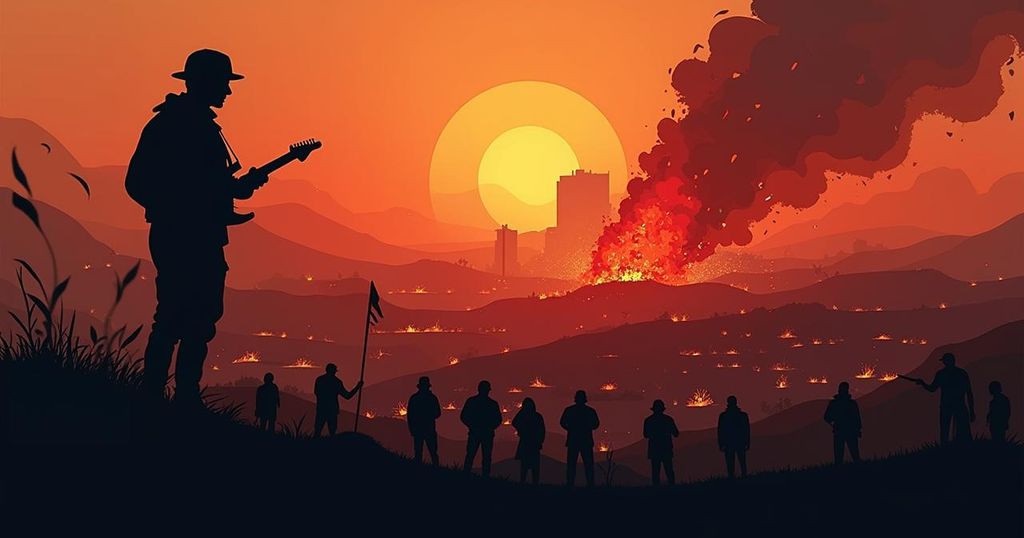Armenia’s ‘Velvet Revolution’: A Journey from Hope to Despair
Armenia is reeling from a devastating defeat in Nagorno-Karabakh, which resulted in over 2,300 fatalities and fostered deep disillusionment with Prime Minister Pashinyan’s government. The aftermath of the conflict has seen a notable shift in public sentiment, moving from the optimism of the 2018 ‘Velvet Revolution’ to a state of despair and concern for the future. The country faces an influx of refugees, escalating COVID-19 cases, and a potential economic crisis, further complicating the political landscape as calls for Pashinyan’s resignation grow louder.
Armenia is currently grappling with the ramifications of a severe military defeat in the Nagorno-Karabakh region. The conflict against Azerbaijan has resulted in a staggering loss of at least 2,300 lives and has dramatically decreased public support for the reformist government led by Prime Minister Nikol Pashinyan. On the streets of Yerevan, the capital, the somber faces of returning soldiers and distraught families underscore the deep psychological and social wounds inflicted by the war. The widespread optimism that once enveloped the nation following the peaceful ‘Velvet Revolution’ of 2018 has dissipated, giving way to a pervasive sense of sorrow. This movement, which had promised a revitalization of the country under Pashinyan’s leadership, witnessed thousands rallying for change against a corrupt regime. However, only two and a half years later, the catastrophic outcome of the conflict has not only shattered the hopes of many but has also redirected the national discourse away from reforms back to survival and stability. Currently, Armenia faces an influx of around 100,000 refugees from Nagorno-Karabakh alongside mounting cases of COVID-19, exacerbating an already precarious economic situation. The impact of the war has caused many citizens to view Pashinyan as a traitor for signing a ceasefire that acknowledged Azerbaijan’s victory—a move that surprised the populace and has prompted significant political backlash. As protests demanding Pashinyan’s resignation gain momentum, even those who once celebrated his leadership are now disillusioned, increasingly critical of his handling of the conflict and its aftermath. The calls for change are met with a complex political landscape, as many fear the return of the former regime, yet there exists a lack of viable alternatives. Amidst the chaos, voices of despair and anger are amplified in public settings, illustrating a nation caught between past hopes and present realities. The challenges ahead are substantial, and with an economic crisis imminent, Armenia’s future remains uncertain. Observers warn of escalating poverty levels and potential emigration as citizens seek better prospects abroad. The collective memory of the recent conflict—paired with historical grievances—adds a layer of complexity to the national psyche, leaving Armenians to ponder the road ahead.
The article discusses the aftermath of the Nagorno-Karabakh conflict, which has dramatically impacted Armenia’s political, social, and economic fabric. Following the positive surge of national sentiment brought about by the ‘Velvet Revolution’ in 2018, the country is now facing a sobering reality of loss, betrayal, and uncertainty. This revolution was a hopeful movement aimed at reform and democratization; however, the recent defeat has caused public sentiment to shift dramatically. The government’s ability to navigate through this turmoil and the changing political dynamics are pivotal for Armenia’s future.
In conclusion, Armenia stands at a crossroads, grappling with the profound effects of a military defeat that has not only cost lives but has also eroded the faith of its citizens in their government. The initial hope sparked by the ‘Velvet Revolution’ is now overshadowed by sorrow and anger, leading many to question the direction of their nation. With an anticipated economic crisis looming, the challenges for Pashinyan’s administration are formidable, and the path forward remains fraught with uncertainty.
Original Source: worldcrunch.com




Post Comment